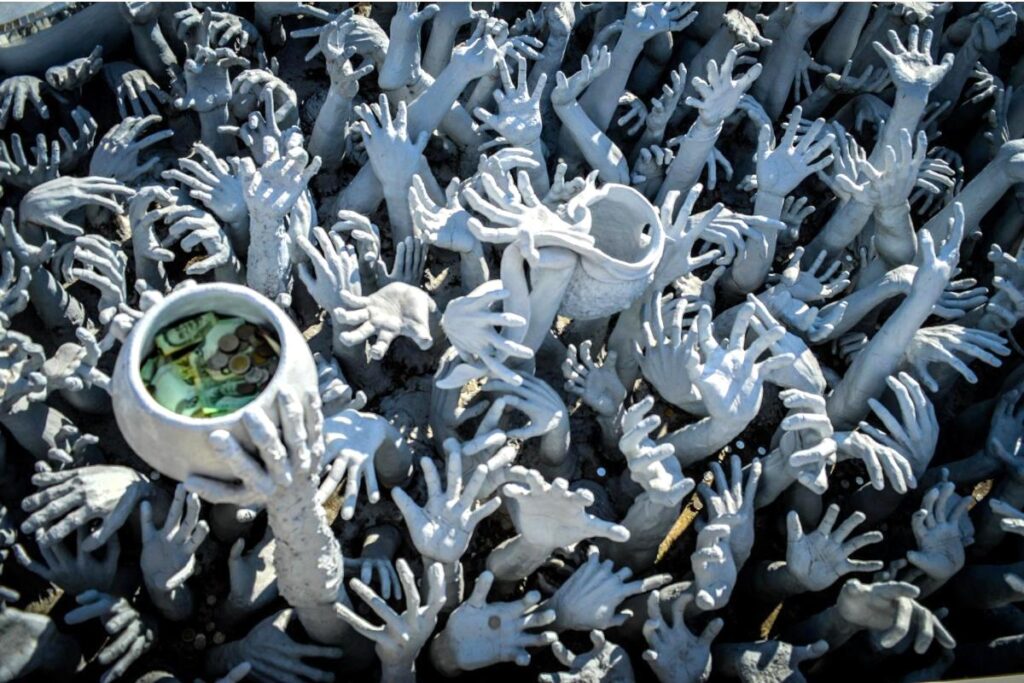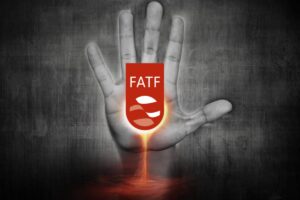Our globalised world means companies can do business across borders – often to societies’ benefit. But what if the expensive new bridge in your city has been built by an unqualified foreign company that cuts corners? Or if your electricity bill is criminally inflated thanks to a backroom business deal? The chances of this are higher if you live in a country with high levels of government corruption.
Public officials who demand or accept bribes from foreign companies are not the only culprits of the corruption equation. Multinational companies – often headquartered in countries with low levels of public sector corruption – are equally responsible.
Twenty-five years ago, the international community agreed that trading countries have an obligation to punish companies that bribe foreign public officials to win government contracts, mining licenses and other deals – in other words, engage in foreign bribery. Yet few countries have kept up with their commitments.
Our new report, Exporting Corruption 2022, rates the performance of 47 leading global exporters, including 43 countries that are signatories to the Organisation for Economic Co-operation and Development (OECD) Anti-Bribery Convention, in cracking down on foreign bribery by companies from their countries. Four leading non-OECD Convention exporters that are also assessed include China, India, Hong Kong SAR and Singapore.
The results are worse than ever before.
IN A NUTSHELL
.
.
Global highlights
Transparency International has been independently tracking major trading countries’ progress in enforcing against foreign bribery since 2009. Our biennial reports score countries based on their performance at different stages of enforcement – from the number of investigations commenced and charges filed to cases concluded with sanctions – over a four-year period. We then classify them by four enforcement categories: active, moderate, limited, little or no.
The picture has been gradually getting worse since our 2018 study, hitting a new low this year.
Corrupt transnational networks of businesses and their enablers leave a trail of harm – pushing out competitors, bypassing regulations and draining public budgets of resources.
Only Switzerland and the United States are now in the category of active enforcement, as Israel and the United Kingdom have dropped from active to moderate enforcement.
Major non-OECD Convention countries remain in the little to no enforcement category – including China, the world’s top exporter, and India, which still has no legislation criminalising foreign bribery. In this group of 38 countries – accounting for 55 per cent of all global exports – foreign bribery abuses go unpunished.
Since 2020, only two countries – Latvia and Peru – have moved up a level while nine – including Denmark and Italy – have dropped. The COVID-19 pandemic has undoubtedly posed a major hindrance at every stage of enforcement from investigation to prosecution, but in many countries the downward trend predates the crisis, and the current picture raises significant concerns.
THE RESULTS
What’s driving poor results?
We find that nearly every country has serious inadequacies in their laws and institutions, which hamper enforcement against foreign bribery.
These include problems related to whistleblower protection, the level of sanctions, a lack of training and resources, the underfunding of key enforcement agencies, poor inter-agency coordination, and the insufficient independence of prosecution services and the courts.
What’s more, foreign bribery cases are complex and often require extensive cross-border cooperation among national enforcement agencies. Challenges remain, however, as many have insufficient or incompatible legal frameworks as well as limited resources for this kind of enforcement.
In the countries that do enforce against foreign bribery, confiscated proceeds of corruption and disgorged profits usually go into their own treasuries. Compensation is seldom made to the states, populations, groups or individuals directly harmed.
Even in countries that do enforce, foreign bribery continues to be treated as a victimless crime. This means states whose companies commit crimes abroad fill their treasuries with multi-million dollar penalties while victims are left to bear the cost.
Our latest report draws attention to positive developments in several significant cases of recent years. In some, compensation for victims has been ordered or is under consideration.
The investment bank and financial services company Goldman Sachs – which has been investigated by at least 14 regulators for its role in the 1MDB scandal – reached a global settlement agreement with criminal and civil authorities in the United States, the United Kingdom and Singapore. The bank admitted to participating in a scheme and agreed to pay US$2.3 billion in penalties and US$606 million in disgorgement. In Malaysia, Goldman Sachs agreed to a settlement consisting of US$2.5 billion in fines and penalties together with the bank’s guarantee that the government would receive at least US$1.4 billion from money recovered from the scheme.
A coordinated global settlement was reached also with the Swiss bank Credit Suisse by the authorities in Switzerland, the United States and the United Kingdom over the infamous “tuna bond” or “hidden debt” case. Alongside the settlement, Credit Suisse forgave debt owed by Mozambique in the amount of US$200 million. However, the harm done to the people of Mozambique has been estimated at US$11 billion.
Further, Switzerland has signed a restitution agreement with Uzbekistan to return US$130 million seized in criminal proceedings against Gulnara Karimova – daughter of the former president. The funds are earmarked for use “for the benefit of the people of Uzbekistan”, and their restitution is subject to transparency requirements and the creation of a monitoring mechanism. Uzbekistan was also granted civil party status in France, where Karimova was accused of laundering proceeds of corruption in French real estate. French justice has awarded damages to Uzbekistan, which are currently being recovered through the sale of three properties confiscated from Karimova.
Despite a few breakthroughs, overall, our new report finds that enforcement continues on the alarming downward trend of recent years. This has huge costs and consequences for countries and people around the world. Foreign bribery undermines democracy and human rights, and thwarts achievement of the 2030 Agenda for Sustainable Development.
IMPROVERS AND DECLINERS (SINCE 2020)
Inaction is not an option
The current global environment carries risks of a declining commitment to foreign bribery enforcement. Individually, countries may prefer to ignore their companies’ efforts to win markets by whatever means possible. However, any short-term illicit profits from foreign bribery are secured at the cost of instability, inequality and a poor environment for international trade and investment – to the detriment of all. This is why it is crucial for exporting countries to enforce collectively agreed prohibitions against foreign bribery.
The need for enforcement is stronger than ever; including to avoid a race to the bottom in the use of bribery in the contest for foreign markets. Transparency International calls on all countries, including signatories to the OECD Anti-Bribery Convention and other major global exporters, to focus on the following key steps to stop rampant foreign bribery:
Fix weaknesses in laws and enforcement systems, including insufficient resourcing and independence of investigative bodies, and give higher priority to enforcement.
Openly publish foreign bribery enforcement statistics, court judgements and non-trial resolutions.
Confiscate the profits from corruption in foreign bribery cases for the benefit of those harmed and introduce victim compensation as a standard practice.
Support stronger national systems for cross-border cooperation and explore the expansion of international structures.
Closely monitor the use of non-trial resolutions.
Support the OECD Working Group on Bribery’s monitoring and engagement with civil society, create a public database of foreign bribery investigations and cases.
.
October 11, 2022 Published by The Transparency.







